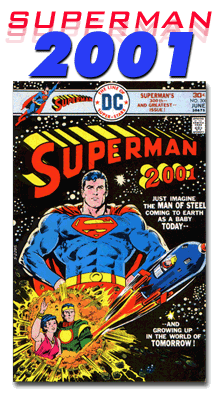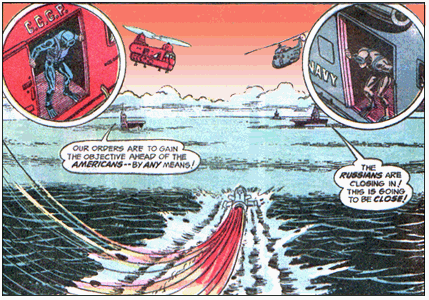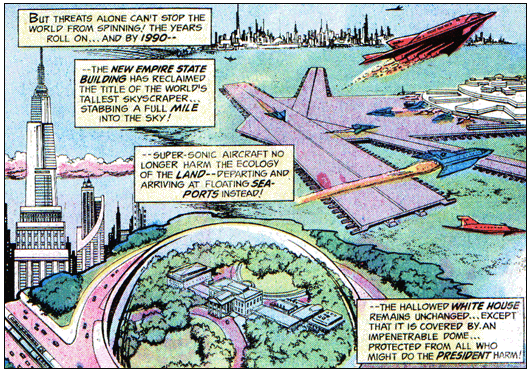 |
Superman (Vol.1)
No. 300
Cover Date: June 1976
Written By: Cary Bates and Elliot
S! Maggin
Pencils: Curt
Swan
Inks: Bob Oksner
Traditionally, comics publishers pull
out all the stops for the "big" anniversaries,
delivering titanic stories with extra pages and an
inflated price tag. This 300th issue of Superman,
however, is an average-length tale at the then-standard
price of 30 cents. In fact, except for a tiny tag
line that reads "Superman's 300th And Greatest
Issue", you might not know there was anything
special going on at all.
Considering the year of its release
-- 1976 -- the anemic format of this issue may well
have reflected the economic recession of the day,
one that led to all sorts of cutbacks in the comics
industry, and everywhere else for that matter.
In fact, even with its focus on the
"far-flung future" of 2001, this comic is
most interesting as a four-color time capsule, a snapshot
of the Bicentennial Summer. Plus it's a plain old
fun read!
|
The Story
Krypton is doomed. Jor-El and Lara place
their infant son in a rocket bound for Earth. So far, so
good. Only in this version of the story, baby Kal arrives
on Earth in the year 1976, and promptly plops himself into
the heart of American/Soviet politics. A confrontational
military race to retrieve the Kryptonian spacecraft from
international waters ends with the Americans victorious,
and for the next few years tensions grow between the two
world powers as rumors persist that the craft contained
an alien passenger, now hidden away in a secret American
base for possible use as a super-weapon.
 Somewhere
in the third world, another nation is eager to maneuver
the two world powers into a confrontation, hoping to rise
to power when they obliterate each other. By now, baby Kal-El
has grown into a teenager, more or less adopted by an American
general who's created for him a red and blue costume from
the blankets in his ship, and added an "S" to
reflect his code-name, "Skyboy." Somewhere
in the third world, another nation is eager to maneuver
the two world powers into a confrontation, hoping to rise
to power when they obliterate each other. By now, baby Kal-El
has grown into a teenager, more or less adopted by an American
general who's created for him a red and blue costume from
the blankets in his ship, and added an "S" to
reflect his code-name, "Skyboy."
Finally, in 1990 tensions boil over and
the U.S. and U.S.S.R. launch their nuclear arsenals. When
Skyboy learns it's all thanks to a disagreement over him,
he leaves the safety of his home at the secret base and
uses his great powers to destroy the missiles. Realizing
how close they've come to destroying the world, the Russian
Premier and American President agree to a lasting peace.
Meanwhile Skyboy has disappeared, and the assumption is
he's either died saving the Earth, or left it in disgust.
In fact, he's thrown away his costume and
adopted the identity of Clark Kent, eventually becoming
anchorman of a 24-hour news channel (pretty far-fetched,
huh?). As the countdown to the year 2001 begins, Clark reports
on festivities in Times Square, where suddenly a four-armed
creature named "Moka" appears, claiming to be
"Skyboy" back from the dead. In fact, he's a robot
controlled by our third-world friends, still looking to
rule the world. As the crowd cheers him on, Moka demands
total allegiance and worship from the people of the Earth.

Clark revives the old costume and smashes
"Moka" in front of a huge crowd, making his first
appearance as "Superman" (a name given him by
someone in the crowd). "It wasn't this plastic container
who saved the world from a holocaust," he explains
to the onlookers. "It was someone who wanted you to
look not to heroes and false gods for salvation...someone
who has enough faith to know that your salvation is within
you...all of you!"
With that, he flies off, and the world has
a new hero. A child asks Clark Kent if Superman will be
back, and Clark answers that, if the need arises, he certainly
will.
My Thoughts
Lots of fun stuff in this one. In the big
picture, of course, it's one of those stories Elliott Maggin
and Cary Bates did so well; the kind that re-affirms what
Superman stands for, and what makes him a "superman"
in the first place. Messianic imagery abounds, sometimes
in uncomfortably obvious ways. Also, the tale reflects the
oft-repeated pre-Crisis theme that every timeline, every
reality, every Earth deserves a Superman, and no matter
how turned around events may become, if there's justice
eventually every Earth will get one.
Art-wise, the story is very nice indeed,
with some of Curt Swan's better work of the period and some
handsome inks from one-time humor strip artist Bob Oksner.
When the issue came out, what made it work
for me was the concept of a Superman who could grow up at
the same time I did, and face the future with me. Now, this
comic is even more fun as a look back at 1976; the Bicentennial
fervor, the cockeyed guesses at America's future and the
atmosphere of Cold War paranoia. As Kal-El's rocket nears
Earth, we get a glimpse of the joint American/Russian space
mission known as Apollo-Soyuz, something all over the headlines
at the time, and a huge symbol of "detente." But
as the story makes clear, underlying the optimism back in
1976 was a deep-rooted sense of fear and unease. Perhaps
we no longer saw the Russians as a godless hoarde, but at
the same time we all knew that the wrong combination of
events, or even a single slip-up by an inept leader on either
side could end life as we knew it.
Adding to the fun is an ad for a Bicentennial
t-shirt as modeled by a very young Todd Bridges ("What
you talkin' about, Willis?") and another for a Superman
belt buckle, "free" if you cut Bicentennial banners
off the covers of twenty-five DC comic books and mail them
in! But the banners are specially numbered, mind you, so
don't think you'd get off without buying such all-time comics
treasures as Blitzkreig #4 and Plop #22!
 So
what did comics writers in 1976 think the world would be
like in the future? Well, by 1990, we should have had a
female President, water-based floating airports, a protective
bubble over the White House (that one is more or less true!),
anti-gravity easy chairs and, of course, clothes like the
Jetsons. So we missed a few, but we did manage the "huge
communications linkup that makes possible a 24-hour news
network" (although terms like "internet"
and "CNN" were a ways off yet). On the plus side,
at least writers in 1976 understood that a real "Millenium
Celebration" should be held on Dec. 31, 2000, as the
new Millenium doesn't start til Jan. 1, 2001! Somewhere
along the way we seem to have forgotten that detail. So
what did comics writers in 1976 think the world would be
like in the future? Well, by 1990, we should have had a
female President, water-based floating airports, a protective
bubble over the White House (that one is more or less true!),
anti-gravity easy chairs and, of course, clothes like the
Jetsons. So we missed a few, but we did manage the "huge
communications linkup that makes possible a 24-hour news
network" (although terms like "internet"
and "CNN" were a ways off yet). On the plus side,
at least writers in 1976 understood that a real "Millenium
Celebration" should be held on Dec. 31, 2000, as the
new Millenium doesn't start til Jan. 1, 2001! Somewhere
along the way we seem to have forgotten that detail.
All in all, a fun look back at the Bicentennial
year, and an amusing glimpse of how we once imagined the
world of today, when it was still "tomorrow."
Personally, I think if Superman could've foreseen what he'd
really be up to these days, he'd have taken off for
Alpha Centauri and cut his losses!
NEW!
Read "Superman: 2001" at "Superman
Through The Ages!"
|


 Somewhere
in the third world, another nation is eager to maneuver
the two world powers into a confrontation, hoping to rise
to power when they obliterate each other. By now, baby Kal-El
has grown into a teenager, more or less adopted by an American
general who's created for him a red and blue costume from
the blankets in his ship, and added an "S" to
reflect his code-name, "Skyboy."
Somewhere
in the third world, another nation is eager to maneuver
the two world powers into a confrontation, hoping to rise
to power when they obliterate each other. By now, baby Kal-El
has grown into a teenager, more or less adopted by an American
general who's created for him a red and blue costume from
the blankets in his ship, and added an "S" to
reflect his code-name, "Skyboy."
 So
what did comics writers in 1976 think the world would be
like in the future? Well, by 1990, we should have had a
female President, water-based floating airports, a protective
bubble over the White House (that one is more or less true!),
anti-gravity easy chairs and, of course, clothes like the
Jetsons. So we missed a few, but we did manage the "huge
communications linkup that makes possible a 24-hour news
network" (although terms like "internet"
and "CNN" were a ways off yet). On the plus side,
at least writers in 1976 understood that a real "Millenium
Celebration" should be held on Dec. 31, 2000, as the
new Millenium doesn't start til Jan. 1, 2001! Somewhere
along the way we seem to have forgotten that detail.
So
what did comics writers in 1976 think the world would be
like in the future? Well, by 1990, we should have had a
female President, water-based floating airports, a protective
bubble over the White House (that one is more or less true!),
anti-gravity easy chairs and, of course, clothes like the
Jetsons. So we missed a few, but we did manage the "huge
communications linkup that makes possible a 24-hour news
network" (although terms like "internet"
and "CNN" were a ways off yet). On the plus side,
at least writers in 1976 understood that a real "Millenium
Celebration" should be held on Dec. 31, 2000, as the
new Millenium doesn't start til Jan. 1, 2001! Somewhere
along the way we seem to have forgotten that detail.